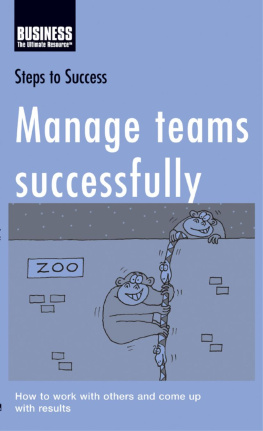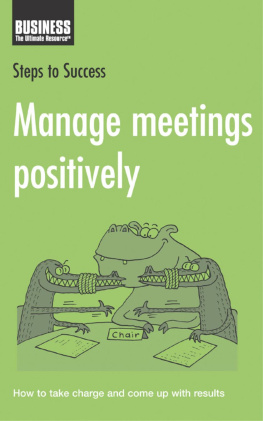


Contents
Answer the questions and work out where you are on the assertiveness scale, then read the guidance points for ideas on how to get the most positive response from those around you.
How often do you feel put upon at work?
a) Regularly, but it is what I expect.
b) I generally feel in control of my workload.
c) Colleagues have finally realized that I am not to be imposed upon.
How do you feel when someone seeks your opinion?
a) Very grateful as it happens so rarely.
b) I feel happy that they value my judgements.
c) Colleagues usually know my opinions already if they have to ask, they werent listening!
Its your annual review and you feel you deserve a decent pay rise. Which is closest to your approach?
a) I wait for them to mention it. They know their budgets.
b) I explain how Ive progressed, and why I deserve a rise.
c) I demand a pay rise or else!
Youre having a discussion with someone who isnt giving you a chance to respond. What do you do?
a) Wait and listen. They may have something valuable to say.
b) Make eye contact and let my body language show Im about to speak, before starting to make my point.
c) Talk louder than them theyll soon stop and listen!
If a colleague asks you to do something which isnt in your job remit, what do you do?
a) Try to fit it in its important to be as helpful as possible.
b) It may provide a useful learning experience, so I try to fit it in, but make sure they know Im doing them a favour.
c) Refuse its their job and their responsibility.
How do you feel about your managers?
a) I worry that they dont think much of me.
b) I respect their experience. Were all on the same team.
c) I dont think much of them, and I try to avoid them so I can get on with my job.
A colleague stops by to chat but stays too long, preventing you from getting on with your work. What do you do?
a) Let them stay, and resign myself to staying late to finish.
b) Explain that I have a deadline to meet and suggest they return another time.
c) Tell them to stop bothering me cant they see Im busy?
You suspect a colleague dislikes you, but arent sure why. How do you deal with this?
a) Pretend Im unaware of their attitude and try my best to avoid them.
b) Talk to them to find out the reason for their aversion.
c) Be confrontational in my dealings with them so that next time they will think twice about being haughty.
a=1, b=2 and c=3. Now add up your scores.
is useful to everyone as it suggests different ways of projecting a more positive image, including paying attention to body language and reacting differently to different character types.
813: Youre at the passive end of the assertiveness scale, and if youre not careful, youll end up being taken for granted, which will make you very unhappy. Assertiveness is not simply about talking more and louder; read offers advice on dealing with your situation.
1418: You have a balanced, assertive approach to your work and colleagues, which would be good to build upon. Develop your non-verbal communication and leadership skills () to hone your abilities and achieve your full potential.
1924: Youre in danger of being aggressive and making enemies. Perhaps your behaviour stems from a lack of confidence in your abilities, and youre overcompensating for this. ). Youre all working for the same side, so you shouldnt feel the need to compete for supremacy!
Communicating assertively at work
Do you find that people get the better of you at work, that youre not given the respect you deserve or that youre always the one who draws the short straw and ends up doing things that you would rather not do? Does this end up making you resentful or unhappy because you feel helpless and unable to confront the situation?
Assertiveness is an approach to communication that honours your choices as well as those of the person you are communicating with. Its not about being aggressive and steamrolling your colleagues into submission. Rather, its about seeking and exchanging opinions, developing a full understanding of the issues and negotiating a win-win situation.
Ask yourself these questions to determine your level of assertiveness:
Do you feel put upon or ignored in your exchanges with colleagues?
Are you unable to speak your mind and ask for what you want?
Do you find it difficult to stand up for yourself in a discussion?
Are you inordinately grateful when someone seeks your opinion and takes it into account?
If you answer yes to most of these questions, you may need to consider becoming more assertive.
Step one: Choose the right approach
Becoming assertive is all about making choices that meet your needs and the needs of the situation. Sometimes its appropriate to be passive. If you were facing a snarling dog, you might not want to provoke an attack by looking for a win-win situation! There may be other occasions when aggression is the answer. However, this is still assertive behaviour as you, rather than other people or situations, are in control of how you react.
TOP TIP
After a lifetime of being the way they are, some people are daunted by the prospect of change. But if you dont change what you do, youll never change what you get. All it takes to change is a decision. Once you have made that decision, you will naturally observe yourself in situations, notice what you do and dont do well, and then you can try out new behaviour to see what works for you.
You may find it helpful to investigate some specially tailored training courses so that you can try out different approaches before taking on a colleague or manager in a live situation. Assertiveness does not develop overnight: it takes time, practice and patience.
Step two: Practise projecting a positive image
Use winning language. Rather than saying I always come off worst!, say Ive learned a great deal from doing lots of different things in my career. Im now ready to move on. Replacing negative statements with positive affirmations is a simple yet powerful way of taking control in your life.
Visualize how you would like to be. Form a mental image of an assertive you, and then make the image as real as possible and feel the sensation of being in control. Perhaps there have been moments in your life when you naturally felt like this, a time when you have excelled. Recapture that moment and live it again. Imagine how it would be if you felt like that in other areas of your life. Determine to make this your goal and recall this powerful image or feeling when you are getting disheartened. It will re-energize you and keep you on track.
TOP TIP
If you are small in stature, its easy to think you cant have presence because people will overlook you. But many of the most successful people in business and in entertainment are physically quite small. Adopting an assertive communication style and body language has the effect of making you look more imposing. Assume you have impact, visualize it, feel it, breathe it.
Next page




















